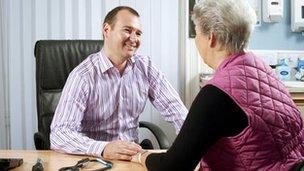Elderly cancer treatment 'shame'
- Published
- comments

Elderly patients 'are not all the same'
The UK has some of the poorest cancer mortality rates in Europe in the over 70s. Recent years have seen efforts to reduce the number of cases of cancer and significant steps to diagnose cancers earlier.
But in Scrubbing Up, Hazel Brodie, older people's expert at Macmillan Cancer Support, warns these measures don't go far enough and that more must be done to ensure older people get access to treatment.
Cancer survival rates are desperately poor among people over 70 who account for half of people newly diagnosed with cancer in the UK. While mortality rates are improving significantly for the under 75s, around 14,000 cancer patients over 75 are dying prematurely each year in the UK.
But there are barriers to treatment.
Research we have done shows older people are less likely to receive surgery, radiotherapy and chemotherapy than their younger counterparts.
This difference in treatment rates cannot be entirely accounted for by medically justifiable reasons such as the presence of untreatable co-morbidities.
We are deeply concerned that treatment decisions are too often being made on the basis of age, regardless of how fit patients may be, leading to under-treatment.
'Inadequate support'
The older population is a varied one.
One 85-year-old may tolerate chemotherapy well, while another may experience complications such as severe toxicity.
Similarly, one 78-year-old may be bed-bound, while another may participate in half marathons.
As such, older people must be treated as individuals.
Clinicians require more information on frailty in order to make appropriate treatment recommendations which is why we are calling for more effective assessments to be used to indicate who will tolerate what treatment.
Inadequate practical support to help older people at home, with transport, or with care for dependent spouses and other family presents another barrier to treatment.
We have heard of older people having to turn down treatment because of this.
Time and time again I hear older people recounting the difficulties they have in getting to and from hospital for their treatment or with meal preparation and shopping.
One 81-year-old said "I didn't have chemotherapy, because they thought if I couldn't get to hospital to have it, it wasn't much good.
"They didn't say that they would provide transport for me".
'Age equality'
This is simply unacceptable.
Patients should be provided with information about local services which can offer practical and social support during cancer treatment. An older person should never refuse treatment because they're having difficulties with transport or caring for a relative.
Age discriminatory practices are also a barrier to older people getting the treatment.
Britain is one of the worst in Europe for negative attitudes to the elderly.
A recent survey undertaken by the British Geriatric Society showed that one third of geriatricians believed that the NHS was 'institutionally ageist.
We want "age equality" within cancer services.
Older people are all individuals with differing levels of frailty, mental attitude, and support.
Each will tolerate cancer treatment differently.
It is vital that steps are taken to ensure that the right people get the right treatment at the correct level of intensity, together with the practical support to enable them to take up and complete the treatment.
Writing people off as too old for treatment is utterly shameful.